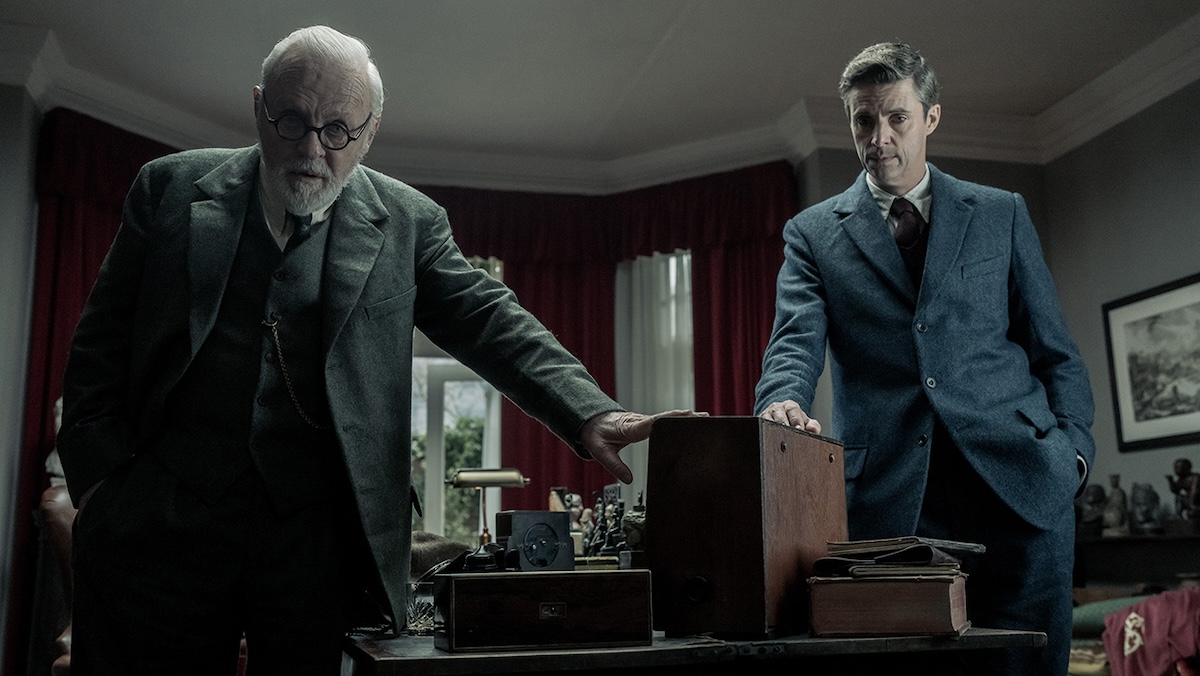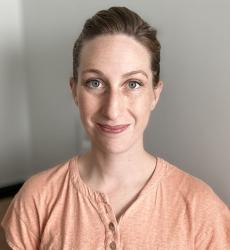Ambiguity is, in a neat mental onomatopoeia, a difficult word to define. But to begin to understand a piece of art like the film Freud’s Last Session, define it we must, and religious artists would do well to try to understand the film.
The film imagines an encounter between the eminent atheist psychologist Sigmund Freud (a mesmerizing Anthony Hopkins) and the rising Christian apologist C.S. Lewis (an unexpectedly sound Matthew Goode) in the early days of World War II. As grainy radio broadcasts track Hitler’s unstoppable advance, Freud and Lewis are locked in their own private war, centering not on who rules Poland but on whether anyone governs existence. Does God exist? is the inciting question of the film, but to understand the two intellectuals’ answers, we must accompany them on a winding journey through both the history of Christian thought and their own personal histories—through Lewis’ territory and through Freud’s, for the historical and the individual are each necessary players in the drama of salvation.
There are germs of reality in the encounter; Freud did in fact meet with an Oxford don in the summer of 1939, though the don remains anonymous. And Freud, who was suffering from incurable jaw cancer, did in fact commit suicide with the help of his doctor just a few weeks later, in September 1939. By imagining that the unknown don was C.S. Lewis, Mark St. Germain (adapting the film script from his original stage play) conjures up a clash between two mighty intellects pushed to the brink by two looming catastrophes: the catastrophe of war and the catastrophe of death.
The conceit of the script—pitting two famous men against each other in a battle of the brains—runs the risk of being either merely clever or didactic; either a vapid if erudite survey of 20th-century ideas or a vehicle for the filmmakers’ own convictions. Miraculously, Freud’s Last Session avoids both these pitfalls. It is instead a searing portrait of two men, both scarred by loss, haunted by terror, but responding very differently.
Ambiguity is that particularly powerful element of well-made art that prevents us from reaching an easy conclusion. It is the experience we have when we walk down a beautiful city street: the lovely shops and gently arching trees give us a sense of peace and flourishing, but on the corner we see a homeless person crouched next to an overflowing shopping cart. Suddenly our simple sense is disrupted, challenged, broadened, expanded by the complexities and difficulties of reality. We aren’t allowed to settle. That is ambiguity.
Ambiguity is a natural consequence of living in a fallen world. Without sin, there is no ambiguity; we can settle. But in the world the way it is, ambiguity serves to remind us that all is not yet well and that we are not yet home. This sense—that reality is many-faceted, that no answer is easy—is the guiding sensibility of Freud’s Last Session.
CONTEMPORARY CLASSICAL DRAMA
From the trailers, I expected the film to be more one-sided. The previews show an incandescent Freud bringing his clinical strength to bear against a fragile Lewis grappling with PTSD from his time in the trenches during World War I. I started the film expecting a faith-on-trial narrative; while this is indeed an element, Freud’s Last Session puts the atheist psychologist on the operating table as frequently as it does the Christian apologist. In fact, it is Freud, not Lewis, who sits on the famous “transformation couch” and is confronted with his anguish (both mental and physical).
The script is pleasingly classical in its structure. It adheres to my favorite of the three Aristotelian unities of drama—the unity of time—though it dispenses with the unity of location in order to show Freud’s daughter, Anna (Liv Lisa Fries), struggling to balance her aspirations as a lecturer in psychology with her crippling co-dependence on her father. By keeping the drama confined to just a few hours, the film generates its own dramatic tension. Will Lewis and Freud find some resolution before Lewis’ train leaves? becomes the question, Will humanity work out its relationship with existence before it destroys itself? In addition to this classical unity of time, Freud’s Last Session keeps most of the action “offstage”; it employs flashbacks and dream sequences to show various traumas, from the horrors of the trenches in France to the devastating effect of losing a parent as a child.
The script handles the most titillating elements of the historical record, namely Lewis’ own difficult relationship with Janie Moore and Freud’s daughter’s likely lesbianism, with appropriate delicacy, respecting Lewis’ and Anna’s own pleas for privacy. In popular culture, Freud is known mostly for his theories about sex and sexuality; those views get a fair treatment here, with restrained visuals that manage to underscore how radical Freud’s arguments really are. The script’s approach to the sexual elements of Freud’s philosophy are among its best moments; for example, Freud declares that all pleasure is sexual and begins with oral stimulation, even as his mouth has been gutted by cancer. Later, he pleads with Lewis to help him remove an agonizing prosthetic mouthpiece, leading to a curiously intimate moment between the men that ends in relieved laughter. This sequence beautifully shows that Freud’s work offers us insights into the psyche while raising the question of whether there are higher pleasures and loves than the merely sexual.
MORE THAN BRAINS
For viewers who have followed either Anthony Hopkins’ career or past films about C.S. Lewis, it is a treat to see Hopkins (who played Lewis in Shadowlands) on the other side of the table. He is remarkable in his role as Freud, passing swiftly from a ferocious atheist to a charming and disarming intellectual to a terrified, demanding, dying old man. What begins as an examination of Lewis’ subconscious becomes, by the end of the film, just as much an examination of Freud’s.
In contrast, Matthew Goode’s Lewis is young, brilliant, and occasionally defensive. He does not have the worldly confidence of Freud. Like a typical young person, he cannot conceal his frustration and irritation with Freud’s seeming erratic questions; when he scores a point, a little spark of triumph crosses his face. It was refreshing to see both these characters played as human beings with personal flaws and foibles. These defects ground the often heady dialogue, reminding us constantly that we are not merely engaging in an intellectual exercise. Rather, we are watching two humans fighting for survival against an enemy of existence: death.
In a particularly revealing exchange, Freud attacks Lewis’ writing group, The Inklings, for their obsession with fantasy. Why aren’t they writing about reality? he asks, implying that it is because they are afraid of what they will discover if they approach reality too forthrightly. Lewis does not directly respond to this criticism, but his own level-headed approach to his belief in God emerges later in a dialogue about the validity of the Scriptures. When Freud accuses the Gospels of being mere fantasies, Lewis quips, “I’m perfectly convinced that whatever the Gospels are, they aren’t myths. They aren’t artistic enough.” This matter-of-fact observation is characteristic of Lewis’ apologetics in Mere Christianity, Miracles,and many of his other writings; faith is a matter of looking honestly at reality and reporting what we see. In the Gospels, Lewis sees a clumsy assortment of strange accounts that somehow changed the course of history. That reality demands his attention and, eventually, his allegiance to Christ.
Freud does not try to dismantle Lewis’ perception; rather, he sets up a rival account of reality, an account rooted in the existence of suffering. A flashback reveals how religious differences broke up his childhood home; this early encounter with the dark side of faith seems to control his psyche. He quotes Christ’s command to “suffer the little children,” then says, “For one bright shining moment, religion made the world our nursery.” That moment has ended for Freud. It is time to “grow up.” Freud advocates for liberation, for freedom from inhibitions (particularly sexual ones), but his call for liberation cloaks a darker conviction. In an astonishing speech, Freud declares, “Our moral certainty is the beast.” We are the apocalypse, he says; we are the darkness. “It seems to me, professor, that we’ve never matured enough to face the terror of being alone in the dark” with ourselves, and nothing else.
MYSTERY AND MADNESS
I find it interesting that Freud’s Last Session scored poorly with critics (44% on Rotten Tomatoes) but fairly well with audiences (74%). Perhaps audiences are more open to intelligent, nuanced artwork that wrestles with the difficulties of faith than film critics. The main criticisms of the film are that it is “too scattered” and that the flashbacks distract from the story. There are definitely flaws in the film; at two points in particular it drags. For the first half of the story, Goode’s Lewis holds himself back from the arguments, showing a caution that I didn’t find particularly believable in the accomplished, daring Oxford scholar. But some negative reviews, which call the flashbacks “distractions” and lament that the film isn’t exclusively rigorous philosophical dialogue, actually illuminate the problem Freud’s Last Session is addressing: the idea that intellectual issues are entirely separate from material ones. Philosophy isn’t something floating above history like a spotless cloud over a battlefield; religion isn’t grafted onto us regardless of our personal histories. Faith, especially the Christian faith, comes to us straight from history. If it is not historical, it is nothing. And it is perfected through our lived lives, which begin in childhood (as we see in the flashbacks in the film).
Freud’s Last Session resists the impulse to sever religion from history and faith from life. It offers no straightforward answers to the question at the heart of the film: Does God exist? But by evoking multiple dueling atmospheres—London preparing to resist Germany, as well as the contending psyches of the protagonists—the film gives us a clear choice of what kind of imaginative world we will inhabit: one in which faith is possible or one in which we are alone in the dark.
Too often, contemporary art offers a clear and easy answer. From the simpleminded faith claims of Christian films like God’s Not Dead to the trite progressive political screeds that fill Poetry Magazine, many artists have abandoned their calling to grapple with the whole of reality—all its contradictions and divisions. Freud’s Last Session, as I’ve said, is not a perfect film; nevertheless, it delivers a hearty antidote to this poison of an easy answer—and it shows that the struggle to grasp reality is worth it.
At one point, Freud says, laughing, “What were we thinking? It was madness to try to solve the greatest mystery of all time.” To which Lewis replies, “Well, there’s a greater madness: not to think of it at all.” Freud’s Last Session compels viewers to think on great mysteries, and that in itself is an accomplishment.

